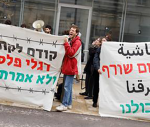You are here
Working for a ceasefire, from the bottom up
Feb 06,2024 - Last updated at Feb 06,2024
Despite the Biden administration’s refusal to back a ceasefire that would help end Israel’s genocidal assault on Gaza, momentum is growing across the US calling on the administration to reverse course. What is significant is that the opposition to the White House’s position is coming from within the president’s own party.
The administration’s stubborn aversion to even the use of the term ceasefire remains inexplicable. It may be recalled that just a few days after the Israeli bombings that followed the October 7th surprise attacks, the State Department issued a statement calling for a ceasefire that was quickly taken down and followed by a guidance memo to diplomats saying the term was not to be used. As the number of civilian casualties continued to grow, administration officials repeatedly fell back on the line that Israel had the right to defend itself, that Hamas had to be eliminated, and that a ceasefire would only allow Hamas to rebuild its capacity. The administration attempted to absolve itself by coupling this rejection of a ceasefire with appeals to Israel to avoid civilian casualties and with support for humanitarian aid.
Those arguments have failed the test of time. The carpet bombing of residential areas of Gaza, the clear intent to demolish housing and infrastructure, the forced evacuation of millions, and more have led to Israel being charged with genocide. And leading analysts in the US and Israel have noted that the “elimination of Hamas” is at best “a fool’s errand”.
As the dimensions of the human tragedy unfolding in Gaza became clearer, the US has found itself virtually isolated in the world community in its rejection of a UAE-sponsored Security Council resolution calling for a ceasefire that would allow unimpeded humanitarian aid. Countering this proposal, the US supported increased aid to Gaza but would not consider the reality that without an end to the bombing aid could not be delivered or reach those most in need.
Slowly but surely US public opinion has changed with substantial majorities now wanting a ceasefire and voters indicating by a two to one margin that they are more inclined to support candidates who call for a ceasefire, with the margin of support for a ceasefire greater among Democrats and key Democratic constituencies (young voters and non-white voters). Still the administration resists.
This past week, a leading Democratic Senator Chris Van Hollen, joined the chorus of legislators calling for a ceasefire, making him the 68th member of the Senate or House of Representatives to do so. This represents more than one quarter of the Democrats in Congress and can be expected to grow.
More significant, and somewhat unexpected, are the numbers of City Councils who have taken up the call for a ceasefire. Led by grassroots mobilisations of Palestinian Americans, progressive Jewish groups and Black activists, major cities like Atlanta, San Francisco, Minneapolis, Detroit, Seattle, St Louis and three dozen other municipalities have passed strong ceasefire resolutions. And while a vote on a similar resolution has been delayed for a few days in Chicago, the US’s third largest city and home of this year’s Democratic National Convention, that city’s mayor, Brandon Johnson, this week issued a strong call in support of a ceasefire.
Because the language used by Mayor Johnson was so evocative it warrants consideration. Echoing the sentiments of his voters, he not only expressed his horror at the loss of life, but also tied the liberation of Blacks with the justifiable need for Palestinian liberation. He said, “I’m not mayor of the city of Chicago if people weren’t pushing the government to recognise the value of liberation, what it means for people, groups and nations. And, in this instance, people should be liberated.”
Just two weeks ago, an Emergency Summit on Gaza was convened in Chicago under the auspices of Rev. Jesse Jackson’s Rainbow Push Coalition. During those sessions, prominent Black clergymen similarly connected their struggle for justice with that of the Palestinians living under occupation. They were joined by progressive Jewish rabbis, Protestant church leaders, Arab Americans and American Muslims, all united in the call for a ceasefire and committed to advancing this effort nationwide. The effort is advancing.
The writer is president of the Washington-based Arab American Institute














Add new comment